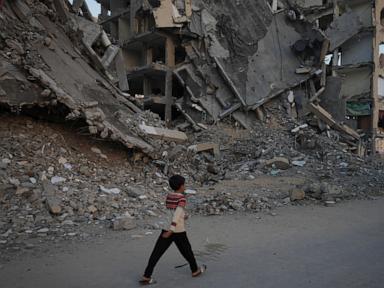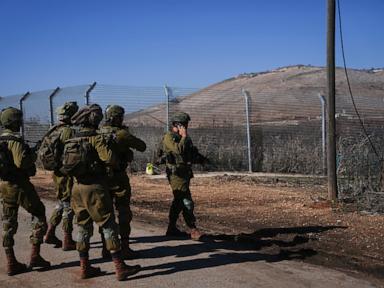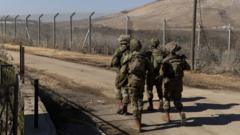Seek an Israel-Lebanon peace treaty, not an Israel-Hezbollah cease-fire

Calls for an immediate cease-fire between Israel and Hezbollah in Lebanon are well-intentioned but shortsighted. If history is any guide, this would only lead to another war between the Iran-backed militia and Israel 10 or 15 years from now.
Instead of a cease-fire, the international community should secure a long-term, permanent peace treaty between Beirut and Jerusalem.
So where are we and how did we get to this point? On Oct. 8, 2023, the Lebanese terrorist group Hezbollah initiated a war against Israel in solidarity with the Palestinian terrorist group Hamas by attacking the Jewish State from the sovereign territory of Lebanon. At least 80,000 Israelis were displaced from northern Israel shortly thereafter.
The democratically elected Lebanese government did not authorize Hezbollah to initiate this war against Israel. This decision was not debated in the Lebanese parliament. Citizens of Lebanon were not consulted either.
One person, the unelected and unaccountable Secretary General of Hezbollah Hassan Nasrallah took this decision unilaterally by the direct order of Iranian dictator Ali Khamenei.
Israel has since decimated Hezbollah’s leadership, logistics, communications, command and control. Jerusalem has given Lebanon the opportunity to restore its sovereignty.
Nasrallah, formerly the most powerful person in Lebanon and the author of its destruction, is dead. So is his cousin and first successor, Hashem Saffiedine. The clock is ticking for Naim Qassem, his second successor.
Though the war rages on, there are nonetheless calls for normalization between Beirut and Jerusalem both within Lebanon and in the Lebanese diaspora.
A peace treaty is, undoubtedly, in America’s interest and, dare I say, in both the Israeli and Lebanese interests. Some parliamentarians, like Nadim Gemayel of the Kataeb Party, are openly calling for this. Whether these calls grow louder depends on at least two conditions.
First, it depends upon whether Israel continues its military campaign against Hezbollah. Namely, by degrading the terrorist group’s military infrastructure in southern Lebanon and the Dahiyeh of Beirut, cutting Hezbollah off from its reinforcements in the Bekaa Valley and western Syria and preventing weapons from being smuggled into Lebanon from its Syrian border crossings.
Second, it depends on whether the international community — including the U.S. — abandons Lebanon. The Lebanese people know better than anyone else that an immediate cease-fire will inevitably lead to Hezbollah resting, reloading, reconstituting and restoring its stranglehold over their country. After that, the terrorist group will exact retribution against those who called for an irreversible peace with Israel.
Many of Lebanon’s oligarchs still remain on the fence. Their indecision is not driven by a lack of belief in Israel’s ability to degrade Hezbollah until it is no longer the most powerful armed group in Lebanon. Rather, they fear that the international community will force Israel to end the war before Hezbollah is sufficiently degraded. At that point, the Iran-backed militia will take reprisals against those who sought peace with Israel, likely causing the outbreak of another Lebanese civil war.
Chief among these characters is Shiite leader Nabih Berri, the head of the Amal movement, speaker of the Lebanese parliament, and the most powerful person in Lebanon after Israel Defense Forces spokesperson Avichay Adraee.
The octogenarian long served as a mediator between Hezbollah and its adversaries in the West and the Gulf. A peace treaty would be contingent on Berri convincing Lebanon’s Shiite community that their interests and future are better served through peace with Israel rather than endless war against the Jews on behalf of Iran or the Palestinians.
Truces between the warring parties have failed time and time again. Though the 1949 armistice agreement brought temporary calm to Israel’s northern border with Lebanon, peace was fleeting. The wars that followed, both between the Palestine Liberation Organization and Israel and the Lebanese Civil War, were worse.
The 2006 Lebanon War also ended with a cease-fire known as United Nations Security Council Resolution 1701. As with U.N. Security Council Resolutions 1559 and 1680, the international community didn’t have the political will and the hard power required to enforce it. The current war, which Hezbollah initiated against Israel last October in solidarity with Hamas, is also worse.
Though there are countless problems to solve on the road to normalization, a peace treaty that recognizes the rights of both Israelis and Lebanese to live in peace and security, demarcates their respective borders, establishes diplomatic relations and makes another war nearly impossible is in everyone’s interest.
So, start from the desired end state, and reverse engineer the requisite solutions.
George Monastiriakos is a part-time professor of law at the University of Ottawa.
-

Why Israel and Hezbollah Are Still Firing Amid a Lebanon Cease-Fire
Some violations of the truce, and some amount of violence, are to be expected, analysts say, and do not necessarily mean the deal will collapse and war will resume anytime soon.The New York Times - 2h -

Hezbollah and Israel Trade Fire, Further Testing Cease-Fire
Both sides have accused each other of violating the deal; Hezbollah fired into Israel for the first time since the truce took effect, and Israel responded with airstrikes.The New York Times - 19h -
Cease-Fire Between Israel, Hezbollah Teeters as Sides Exchange Fire
The flare-up in fighting highlights the ambiguities within the deal over how the cease-fire should be enforced.The Wall Street Journal - 57m -

Israel-Hezbollah cease-fire threatened after barrage of attacks
Israel and Hezbollah traded new attacks Monday, stoking concerns their fragile cease-fire could unravel less than one week after going into effect, but the Biden administration insists the deal is ...NBC News - 5h -

Middle East latest: Israel and Hezbollah trade fire, threatening Lebanon ceasefire
The Lebanese militant group Hezbollah has fired into a disputed border zone held by IsraelABC News - 17h -

Israeli strikes kill 11 in Lebanon after fire exchanges with Hezbollah that test ceasefire’s limits
Israel has unleashed its largest wave of airstrikes across Lebanon since agreeing to a ceasefire with Hezbollah last week, killing at least 11 peopleABC News - 8h -

Israel carries out airstrikes in Lebanon after Hezbollah rocket fire – Middle East crisis live
Israeli military spokesperson says army attacking targets in Lebanon with ‘further details later’. Fighting has had a heavy toll in Lebanon in the last 13 months, with almost 4,000 people killed by ...The Guardian - 21h -

Lebanon ceasefire under strain after Israeli strikes and Hezbollah mortar fire
Lebanon says 11 people were killed in Israeli strikes after Hezbollah fired mortars at an Israeli army post.BBC News - 6h -
Israel says it has been fired upon from Lebanon, despite ceasefire
Yahoo News - 23h
More from The Hill
-

CNN's Kaitlan Collins: Biden pardon sounded like Trump Truth Social post
The Hill - 29m -

Bloomberg: RFK Jr. would be 'beyond dangerous' as HHS head
The Hill - 36m -

Is the Ukraine conflict a proxy or direct war against Russia?
The Hill - 40m -

12:30 Report — Did Biden puncture his legacy?
The Hill - 40m -

DNC chair minimizes November losses, argues Democrats have ‘robust’ foundation
The Hill - 40m
